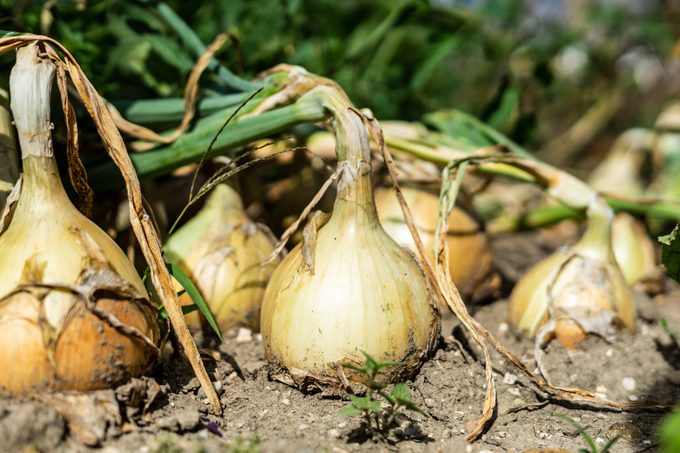How To Grow Onions
When I was growing up, my dad planted tiny little onion bulbs in early spring. We harvested them as green onions when they were about a foot tall. Later I learned there are other ways to grow onions, and many more varieties than just that one variety my dad grew.
Types of Onions
There are two basic types to grow in your garden: bunching and bulbing.
Bunching onions
Bunching onions, Allium fistulosum, do not form bulbs; they’re grown and harvested as green onions or scallions. In some warmer climates, they’re a perennial vegetable and may overwinter. A common variety is ‘Evergreen.‘
Bulbing onions
Bulbing onions, Allium cepa, produce bulbs. Here are the types:
- Short-day: These, such as ‘Red Burgundy,‘ produce bulbs with 10 to 12 hours of daylight. If you garden in the South, USDA Plant Hardiness Zone 7 and warmer, plant short-day varieties.
- Long-day: These, such as ‘Yellow Sweet Spanish,‘ produce bulbs with 14 to 16 hours of daylight. If you garden up North in USDA Zone 6 and colder, plant long-day varieties.
- Intermediate day or day-neutral: These, such as ‘Candy,‘ are adaptable to many areas, requiring 12 to 14 hours of daylight to form bulbs.
How To Plant Onions
Onions can be grown from seeds, seedlings or onion sets.
Seeds and seedlings for bulbing onions
- Sow seeds indoors 10 to 12 weeks before your average last frost in spring. Use a seed starting mix and sow in a container about 1/2-inch deep and 1/2-inch apart.
- Cover the container with a clear cover to keep soil moist until seeds germinate, then remove the cover. If you lack a sunny window, use a grow light.
- Seedlings don’t need thinning out. If they get too tall, cut them off to about three inches.
- Harden off seedlings by putting them outside on milder days for a few hours.
- Four to six weeks before your average last frost, plant onion seedlings outside in a sunny location with well-drained soil rich in organic matter. Plant seedlings three to four inches apart and about four inches deep.
- In warmer climates, you can also plant onions in the fall to overwinter.
- To harvest some onions as green onions before the bulbs form, plant bulbs one to two inches apart, then pull every other onion before bulbs form.
Onion sets for bulbing onions
- Buy onion sets (small, immature bulbs) in early spring.
- Plant onion sets four to six weeks before your average last frost.
- To harvest some onions as green onions, plant bulbs one to two inches apart, then pull every other onion before bulbs form.
Bunching onions
- Start seeds as you would for bulbing onions.
- Plant in the garden a few inches apart four to six weeks before your last frost. They do not need as much room to grow as bulbing onions.
- In warmer climates, you can also grow bunching onions in fall and winter.
How to Grow and Care for Onions

Watering
Keep onions evenly moist; they require a lot of water as bulbs form. Once the green shoots are about a foot tall, mulch or hill up the ground at the base to preserve soil moisture.
Weeding
Remove any weeds by hand or lightly hoeing around the rows.
Fertilizing
Onions like soil enriched with compost because they’re heavy feeders. Add a fertilizer labeled for vegetable garden use at planting time, and up until bulbs begin to form. Bulbs are forming once you see the soil pushing away from the shoots.
Flowering
Generally, don’t let your onions flower. If onions begin to flower, snip off the flower buds and plan to harvest those onions first.
Insects and diseases
Some plant diseases and insects can be a problem on onions. These include botrytis blight, which shows up as whitish lesions on the leaves, and onion maggots, fly larvae that feed on the onion bulbs.
To control these and other pests, keep water off the leaves and practice crop rotation. Plant your onions in different spots in the garden for at least four years.
How To Harvest Onions
Bulbing onions
- Bulbing onions are ready to harvest when the leaves turn yellow and begin to fall over.
- Pull or carefully dig out onions and lay them in a protected location to dry in the sun for two to three days. To avoid sun scald, cover lightly with straw or another covering that allows for good airflow. Continue curing for another week or so in a dry area with good air circulation.
- Once dry, cut stems to one inch, and roots to 1/4-inch and store the onions in a cool, dry location.
- Check stored onions periodically. If any are sprouting in storage, use them right away.
Bunching onions
- Bunching onions can be harvested at any time by gently pulling them out of the ground.
- Bunching onions are frost-tolerant but should be harvested before a hard freeze.
No comments